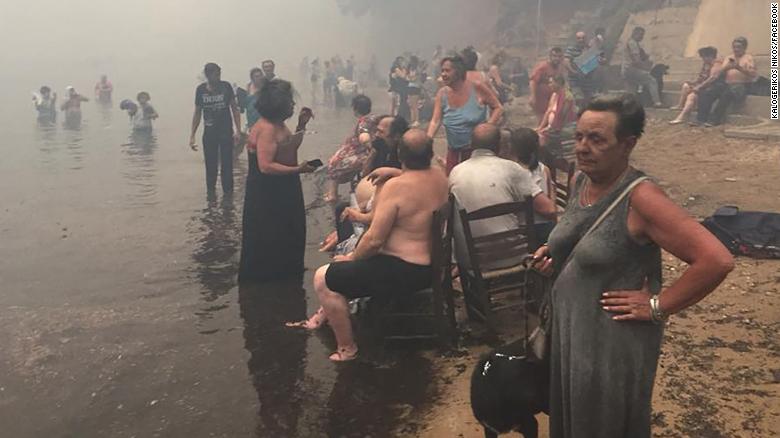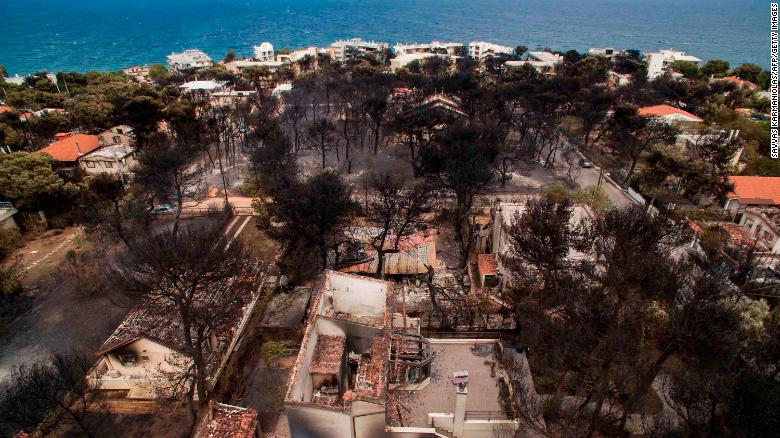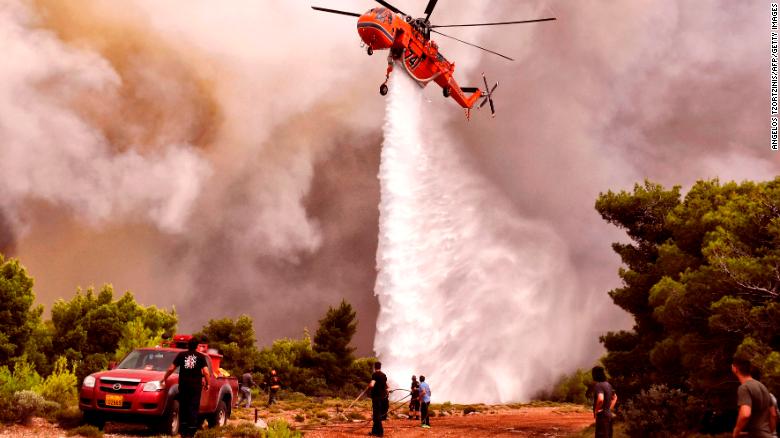Ferocious, Killing Wildfires in Greece
"We assume they became trapped by the fire because it was so strong and so fast."
"Some were huddled together as if trying to protect each other. They were badly burned and have not been identified."
Haris Malimagolou, Hellenic Red Cross, Refina, Greece
"We ran to the beach. We were all crowded on to the sand and rocks. Then all the trees surrounding the beach burst into flames. I jumped in the water because I didn't know what else to do. Ash was falling on me from the sky while I was in the water."
"We were not informed and were not evacuated. There was a big lack of communication."
Paulina Corvisier, 25, French tourist, Mati, Greece
"We went into the sea because the flames were chasing us all the way to the water. It burned our backs."
"It reminded me of the eruption at Pompeii. It was terrible."
Kostas Laganos, wildfire survivor
"It happened very fast. The fire was in the distance, then sparks from the fire reached us. Then the fire was all around us."
"The wind was indescribable ... it was incredible. I've never seen anything like this before in my life."
"We ran to the sea. We had to swim out because of the smoke, but we couldn't see where anything was. We fell into the sea and tried to distance ourselves, to get away from the monoxide. We went as far in as we could. But as we went further, there was a lot of wind and a lot of current and it started taking us away from the coast. We were not able to see where we were."
"It is terrible to see the person next to you drowning and not being able to help him."Nikos Stavrinidis, wildfire survivor
 |
| Deadly wildfires ravage Greek towns CNN |
Greece is accustomed to spontaneous wildfire eruptions in their forests, as a yearly event geared to time of year and dry conditions. But not ever a wildfire eruption of the intensity and speed with which these have overtaken communication, resources and people's lives. A group consisting of 26 bodies many of whom were children, driven to the sea in a desperate effort to escape the wildfire was engulfed instead before they could reach the water, overcome mere metres from the shore.
They shared a comforting group embrace before perishing, and this is the way they were found by the Greek Red Cross.
Residents and tourists caught up in the sudden panic of outrunning the surprise advance of wildfires were devastated by their escape from death. By Tuesday night the official death toll stood at 74 deaths with the knowledge that more bodies will be found to raise that total. Those who survived feel they have ample reason to express their frustration and anger with the experience when a lack of resources became evident and they were forced to fend for themselves, no obvious official presence to take on the wildfire, much less warn and reassure locals and vacationers of what was occurring.
 |
| People take refuge Monday from the fires along the beach north of Mati. |
Mr. Stavrinidis, and those with him who had survived were rescued by an Egyptian crew in a fishing boat. Four separate areas of Greece were consumed by fires that began in Corinth on Monday morning. Mati, a small town in the eastern region of Rafina, popular with Greek families and pensioners was the worst hit; utterly consumed, not much of it remaining. The hundreds of people who evacuated in a burst of life-preserving energy after roads were blockaded by burning cars and the oncoming fire, were rescued by boat.
Over seven hundred people were ferried to the port of Rafina. Its mayor, Evangelos Bournous, spoke of over one thousand buildings and 300 cars damaged, leaving the village a smouldering wreck and leading her to announce, "Mati no longer exists". EU members Cyprus, Spain, Turkey, Italy and Germany responded to Greece's call for aid, offering what support they could, the EU promising it "will spare no effort to help".
 |
| An aerial view shows burned-out houses in Mati. |
"We have been asking for more resources for any years. We have been asking for a new aircraft. But even if we'd had ten [additional aircraft] it may not have made a difference as the fire was so strong because of the winds, and houses and trees so close together", stated two firefighters on condition of anonymity, who had long warned they were not equipped to fight a major incident, though it would seem that even they might never have imagined the severity of such a wildfire that struck the area, dubbed one of 'biblical' proportions.
Bodies were found inside homes and in burnt-out vehicles. Some people who had leaped into the sea failed to escape death, dying as a result of smoke inhalation from the fumes that billowed out and across the water, to consume their lives. Rescue workers, stated Panos Skourletis, Greece's interior minister, were "still searching to see if there are more missing".
"I saw dead people. I saw at least 300 cars burned. I saw the burned houses. There is no such settlement [Mati] anymore.""We are trying to function in another reality because two settlements, Mati and Kokkino Limanaki [just south of Mati], have disappeared. They have been lost on the map. The number of dead is rising.""It has changed the landscape. We live another reality."Evangelos Bournos, mayor of Rafina-Pikermi
 |
| A firefighting helicopter drops water to extinguish flames Tuesday in the village of Kineta. |

<< Home